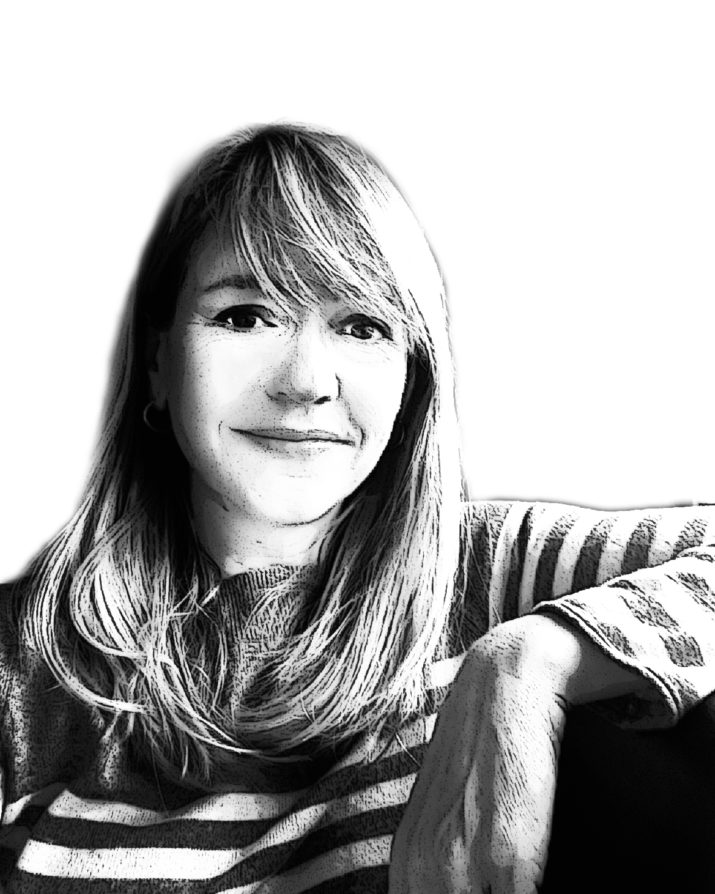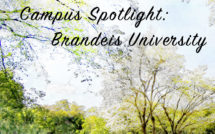
Language, Affect, and Everyday Experience in Post-colonial Africa: An Interview with Janet McIntosh

This is part of our Campus Spotlight on Brandeis University.
To contextualize her course syllabus on “Colonialism and Post-coloniality in Africa: Encounters and Dilemmas,” which Campus is publishing as part of this issue’s special feature on the historical and contemporary relationships between Europe and Africa, Janet McIntosh answers a few questions about her research and her teaching. In this interview, the anthropologist delves into her disciplinary approach to the study of Africa, some of her classroom pedagogical strategies, her fieldwork experience in Kenya, and her work on the dimensions of African whiteness. As she reviews issues of race, technology, language, privilege, land tenure, and national loyalty, she highlights the many layers of post-colonial plural identities and belongings.
—Hélène B. Ducros for EuropeNow Campus
EuropeNow Could you tell us about your field of study as it pertains to your research in Africa?
Janet McIntosh I have wide-ranging interests in the discipline of anthropology, but I can say a few words about how I’ve brought together some themes in linguistic anthropology and psychological anthropology with my ethnographic work. I take the domains of language and the psyche as points of entry through which to explore power relations and cultural contact between groups. The advantage of scrutinizing e.g. language in use, or ideas about language (“language ideology”), or affect and subjectivity, is that you can explore how macro-level structural issues play out in the minutiae of everyday practice and experience. It’s exciting, convincing, revelatory, and dismaying to see how the abstractions of “power” and “social change” live and breathe in this way.
So, for instance, in one article about cell phone text messaging (titled “Mobile Phones and Mipoho’s prophecy”), I explored how the first generation of Giriama people of the Kenya coast to own cell phones fantasized about participating in the global flow of ideas and commerce, something you could see even in their code-switching. I found they tended to link English to a kind of cosmopolitan, neoliberal, playful, even promiscuous self, free of social and kin obligations…even as they linked their natal language, Kigiriama, to a kind of gravitas bound up with kin obligations and responsibilities. It’s as if they were switching over their personhood in different languages on the tiny proscenium of their cell phone screens, with each linguistic stance entailing gains and losses. It should be noted, though, that elder generations were feeling these changes as a keen loss, and some see these youthful texting practices as a form of witchcraft that portends social disintegration. In some of my other work, including my first book (The Edge of Islam: Power, Personhood, and Ethnoreligious Boundaries on the Kenya Coast, 2009), I’ve explored how socioeconomic and religious hierarchies between Swahili and Giriama peoples have played out in their code use and their language ideologies. Arabic, for instance, is powerfully essentialized by both groups (including non-Muslim Giriama), and conceptualized by some Giriama as a mystical locus of Swahili power that helps to explain Swahili economic advantages. Many Giriama spirit mediums in the area where I worked would be possessed by Arabic-speaking spirits to deliver their most potent oracles, and yet just as Giriama tend to experience powerful Swahili and coastal Arabs as oppressive, it was striking that one of the most common symptoms of madness was being possessed by a Muslim spirit and starting to babble in Arabic.
As I shifted into studying white Africans, another linguistic-anthropological approach I’ve taken has been to look at historical shifts in language ideology among colonial settlers and their descendants. In a chapter in my book Unsettled: Denial and Belonging among White Kenyans (2016), for instance, I look at the reversal of colonial-era language ideologies. Plenty of settlers barely deigned to learn more than “kitchen Kiswahili” (there were exceptions, of course, but denigrating African languages was a common stance among colonials). Today, though, white Kenyans are at pains to establish themselves as good Kenyans who belong to the nation, in spite of scandals in their community, in spite of controversy over their land holdings, in spite of Kenyan voices that deem them “old colonials.” Accordingly, many will effuse about how “beautiful” they find Kiswahili and how fervently they wish they spoke it even better than they do. There is sort of a related dynamic among left-leaning white South Africans in Cape Town when it comes to isiXhosa—I recently submitted an article about that. Often language attitudes stand in for broader social attitudes, and as the weight of historical judgment has come out against colonialism and apartheid, you can see white Africans struggling with how they can be counted as belonging. On the one hand, it’s quite positive that whites are caring more about African languages, but if one wants to be cynical one can point out it’s an easier matter for them to address than, say, trying to even out the economic playing field. There’s also a hidden ideological dimension to how white Kenyans conceptualize African languages; my respondents, for instance, tended to link them to “the heart” and English to “the head”—inadvertently recapitulating colonial stereotypes.
Finally, I’ll add that my entire second book is framed by psychological anthropological concerns. I was really writing about a kind of moral double consciousness on the part of white Kenyans, some of whom have become anxiously self-conscious since the British Empire lost control of the historical narrative in sub-Saharan Africa. Some of my interlocutors toggle back and forth between pained awareness of their critics and protestations that they are good nationals whose love for Kenya, for Kiswahili, for the land and wildlife, even for their servants should be beyond reproach. There’s some real feeling in their announcements of loyalty, but I also took note of their dismissals, their blind spots, and their selective ideologies in trying to find a place of comfort. In that process, they seemed not fully to grasp why their position of privilege might be so resented by some. I coin the phrase “structural oblivion” to capture their subject position in these denials.
EuropeNow Part of your work in Africa is inscribed in “Whiteness Studies”. Could you explain what this is? How did you get interested in this topic?
Janet McIntosh “Whiteness studies” in the United States originated partly to draw attention to white privilege while making whiteness visible as a race, rather than letting it remain in the shadows as the hegemonic, “default” racial setting (the racial identity whites never knew they had, as it were). As a subject position, whiteness is often defined in terms of whites’ support of their own supremacy or hegemony, through whatever mechanisms. It’s hard to do justice here to the foundational work on whiteness (though I should mention Ruth Frankenberg’s, Richard Dyer’s, and Linda Alcoff’s names), but the dimensions of whiteness I’ve been most interested in have been quiet and not obviously in search of anything like (for instance) violent supremacy. Work in this vein includes Peggy McIntosh’s (1988) and Shannon Sullivan’s (2006) work on white privilege as habitual and unconscious, and Charles Mill’s (1997: 18) suggestion that a tacit “racial contract” produces for whites an “epistemology of ignorance…producing the ironic outcome that whites will in general be unable to understand the world they themselves have made.” My concept of structural oblivion (developed in Unsettled) discusses not just denial and ignorance, but also particular ideologies—about land, about the economic and political world, about personhood, about rationality, and so forth—that help to prop up white advantages in Kenya. But the general concept of structural oblivion can be applied to elites anywhere.
At the same time, one of my points—a point made by other scholars of whiteness too, including John Hartigan—is that “whiteness” is plural and changing. In sub-Saharan Africa, Melissa Steyn of South Africa has discussed these issues most extensively. Among white Kenyans, I found white advantages can no longer be publicly defended by recourse to social Darwinism. Whites have been too publicly lacerated over colonial racism for that kind of stance to fly. Instead, there are subtler ways for them to engage in cultural racism, or other subtler means of holding on. And yet, the very sense of feeling vulnerable, of feeling that one’s privilege may be imperiled, and a spectrum of responses to this quandary—from guilt to defensiveness—should be folded into our understanding of “whiteness.” I’m currently collaborating with several scholars who work on white Africans in South Africa, Botswana, and the former Rhodesia; we’re looking at contemporary anxieties of whiteness, and corresponding backlashes, in these contexts and beyond.
How did I get interested? As I did my research on Giriama and Swahili, some white Kenyans would ask about my work. I was fascinated to hear some colonial attitudes I’d only read about in books, but also to hear more layered and ambivalent stances, including when younger white Kenyans were trying hard to distinguish themselves from their predecessors. And then a particular topic also sucked me in: their relationship to the African occult. One after another, white Kenyans would tell me witchcraft and spirit beliefs are superstitious rubbish, but then as I got to know them a little better they’d fill me in on how badly they’d been spooked by a curse, or about that spirit healer they hired to deal with witchcraft at their house. They discussed this in an “off the record” fashion, since it violated their European sense of rationality. Something about identity and power was afoot.
You could say there’s another reason I got interested in whiteness: Peggy McIntosh is my mother. But at the conscious level, anyway, I felt like I came to the topic indirectly, when I was interested in the peculiarities of post-colonial identities, and before I was even thinking about all of this in terms of whiteness per se.
EuropeNow What are the sort of assignments that your students enjoy most in learning about the history of colonialism and post-colonialism in Africa?
Janet McIntosh Some of the most tantalizing discussions come in our unit on land reform in Zimbabwe. I have students watch a documentary entitled “Mugabe and the White African” (2009), which furnishes a remarkable example of how a media product can encourage structural oblivion. The film focuses on a white Zimbabwean farming family subject to Robert Mugabe’s “Fast Track” land reform, a program that after the year 2000 violently displaced several thousand white Zimbabwean commercial farmers and redistributed their land, partly to Mugabe’s cronies, but also to many thousands of formerly landless black Zimbabweans. The documentary frames itself as an expose of Mugabe’s racist persecution of Zimbabwe’s whites, and received great critical acclaim on its release in the UK and USA. The filmmakers follow the travails of two white Zimbabwean farmers as they are menaced by thugs (probably state-sponsored) who wish to drive them away from the land. Most western viewers are appalled by the brutality against the whites; if all you have to go by is the film, your opinions about land redistribution are entirely shaped by the fact that your heart is breaking for this anguished farming family. But the documentary offers zero historical or political context for the events in question. There’s no discussion of the fact that most of Zimbabwe’s good arable land was still concentrated in the hands of a few thousand white farmers as a legacy of imperialism; nor of the available evidence suggesting that although land reform was implemented through awful (and presumably avoidable) violence, though it victimized immigrant farm workers, and though it compromised overall agricultural production, it may have given hope to a critical mass of poor black Zimbabweans who got a chance to make this new agrarian structure work for them. In class, through readings and other materials, we try to contextualize land reform so we have a more complex framework in which to consider the reasoning behind it, the objections to it, and its mixed effects on a variety of constituents in Zimbabwe. Students found this exercise incredibly engaging. Among many other things, they grew more sophisticated in thinking about representational politics.
Janet McIntosh is Professor of Anthropology and Chair of the Department of Anthropology at Brandeis University. She earned a BA at Harvard University and a second BA at Oxford University, then undertook graduate training at the University of Michigan, earning her PhD in 2002 and winning a Distinguished Dissertation Award. Her first book, The Edge of Islam: Power, Personhood, and Ethnoreligious Boundaries on the Kenya Coast (Duke University Press, 2009), won the 2010 Clifford Geertz Prize in the Anthropology of Religion. Her second book, Unsettled: Denial and Belonging among White Kenyans (University of California Press, 2016), received Honorable Mention in the 2017 Victor Turner Prize for Ethnographic Writing. She is currently making a professional detour in response to the Trump administration, co-editing a volume with Norma Mendoza-Denton about language in the era of Donald Trump. In 2018-19 she will pursue a study of language in the United States military with the support of an ACLS fellowship. She lives in Brookline, Massachusetts, with her husband Tom and sons Tobias and Theo.
Hélène B. Ducros is the Chair of the Research Editorial Committee at EuropeNow.
Published on March 1, 2018.




